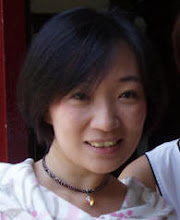By Nick Thorpe
BBC News, Kosovo
Almost all the bakers of the old Yugoslavia were Albanians, from one small corner of Kosovo. They have lived through war and upheaval but the toughest test for some came in February this year when Kosovo broke away from Serbia.
幾乎前南斯拉夫所有的麵包師傅都是來自科索沃的阿爾巴尼亞人。他們歷經戰火和動亂,但對一些人來說最艱巨的試煉莫過於今年的二月,科索沃自塞爾維亞獨立。

The first poppies of summer are blood scarlet on the shores of the White Drim river as we drive out of Prizren, up onto the slopes of Mount Pashtrik.
當我們駛離Prizren市沿著Pashtrik山的山坡向上爬時,今年夏天第一批鮮紅血色的罌粟花在White Drim河岸邊正盛開著。
The lunchtime bread in the largest village, Djonaj, is white and so fresh it melts like chocolate in your mouth.
午餐時間在最大的村莊Djonaj所享用的麵包,又白又新鮮,像巧克力一樣入口即融。
Dine Rexhbecaj is 50 and home for a short break to see his family. He has eight children, six girls and two boys. They live here while he works in distant Zagreb, in Croatia, seven or eight months of the year.
50歲的Dine Rexhbecaj利用短短的休假期間回來探視家人。他有八個小孩,其中六個是女孩,兩個是男孩。他們住在這裡,而他一年當中有六到八個月的時間是在離這裡很遠的克羅埃西亞的Zagreb這個地方工作。
"I like my work," he said. "But I would hope for something better for my children. Now that Kosovo is independent, I hope they can find work here and not travel abroad."
"我喜歡我的工作,"他說。"但我還是希望我的孩子們能有更好的選擇。現在科索沃已經獨立了,我希望他們能在這裡找到工作而不須要再離鄉背井到國外去了。"
'Bread money'
The village streets bustle with women and children on their way home from school. Four little girls, each dressed in a different shade of pink, giggle by.
村裡攜來攘往的街道上都是女人和下課返家的小孩。四個身著粉紅色深淺不一的小女孩,咯咯地笑著從我們旁邊經過。
In a graveyard beside the road, children play ball, and brown cows graze among red and black Albanian flags.
小孩子在路旁的一座墓園裡打球,紅黑色的阿爾巴尼亞旗幟間,可以看到有棕色的母牛在低頭吃著草。
Houses are being repaired with money sent from abroad, "bread money" one might call it. It goes towards new bathrooms in the traditional extended-family compounds, and to repair the tall outside walls and daunting gateways.
修繕家園所需的金錢都寄自國外,也可以稱之為麵包錢。這些錢幫助這些傳統大宅院蓋了新的浴室,修補高聳的外牆和令人望而生畏的大門。
This is a male-dominated society but the men are gone, scattered to the four corners of the Balkans, to Serbia and Croatia, Bosnia and Slovenia.
這是個以男人為主的社會,但是現在男人都出外去,分散在巴爾幹半島的四個地區,塞爾維亞、克羅埃西亞、波士尼亞和斯洛維尼亞。

Working a baker's dozen of hours each day, they roll out the much sought after burek - spinach or cheese, potato or meat-filled pies - round breads and crescent-moon-shaped rolls, star-scattered with sesame seeds.
麵包師父每天十幾個小時的工作中,他們做出許許多多極受歡迎的布雷卡 – 一種有菠菜或起司,馬鈴薯或肉餡的派 - 圓麵包和新月型麵包捲,佈滿了芝麻。
And when they finish their long shifts, the fathers can only dream of the children growing up without them.
長長的工作時間結束後,這些做父親的只能想著成長中沒有自己陪伴的孩子。
"I started work as a baker in Montenegro when I was 13," Alush Maloku tells me in Planeja, a village at the end of a mountain road, hunched against the Albanian border.
"我13歲的時候在蒙特內格羅開始學習當麵包師傅,"Planeja村的Alush Maloku告訴我,這個村子在山路的盡頭,推進到阿爾巴尼亞的邊界。
"Then I came home and worked as a shepherd for 12 years."
"接著我回家當了12年的牧羊人。"
Then he went back into baking, this time in western Serbia. All these places were part of one country, then Yugoslavia.
接著他又再回去烤麵包,這次則是到了西塞爾維亞。所有地方都是屬於前南斯拉夫這個國家。
In 1979 when his father died, he came home to run the village shop. As the eldest son, he had to care for his family.
1979年他的父親過逝,他回家經營開設在村子裡的店舖。身為長子,他必須照顧他的家庭。
Trade map
We are sitting barefoot, cross-legged on a rug on his porch, looking across the valley at the ruins of his old house.
我們光著腳盤腿坐在他家陽台的地毯上,望著位於河谷另一頭他的老家。
American B52 bombers blasted the Serbs into submission here in 1999 after the Albanian villagers had been driven out. The Serbian army, living in quarters nearby, sustained some of its heaviest losses in the air raids.
在阿爾巴尼亞村民被驅逐之後,美國B52轟炸機的轟擊迫使塞爾維亞在1999年投降。塞爾維亞軍隊,特別是在附近的幾個軍營,在空襲遭受了幾次最嚴重的損失。
Unexploded bombs still lie buried deep in the earth. Alush said he knows of five people from a neighbouring village who have lost limbs as they stumbled across war litter.
好些未爆彈仍深埋在土裡。Alush說他知道鄰村有五個人都是因為不小心碰到這些戰爭中投下的未爆彈而失去了手或腳。
"We paid a high price for liberation," he says.
"我們為了自由付了極大的代價,"他說。
"Why do all the men here become bakers?" I ask 79-year-old Azem Collaku from the village of Zym.
"為什麼這裡的男人都會成為麵包師傅? "我問一位來自Zym村79歲的Azem Collaku。
He rolls out a mental map of Kosovo, divided by traditional trades.
他攤開了一份被傳統貿易劃分開來的科索沃心智地圖。

The bakers from the Harsi i Thata - the dry hearth - so called because of its paucity of water. The builders from a certain valley. The farmers from the flat, fertile lands between Prizren and Djakova.
麵包師傅來自Harsi i Thata也就是乾燥的爐灶之意,源自於當地缺乏水資源。建築工人來自某個山谷。農夫則是來自Prizren與Djakova間平坦肥沃的土地。
Azem worked for 40 years in the family bakery in northern Kosovo, in the ethnically-mixed town of Mitrovica. In 1999, when the Nato bombing started, the hostility of the local Serbs to the Albanians increased.
Azem在科索沃北邊自家的麵包店工作了40年,那是一個有著多元化民族的城市Mitrovica。當1999年北約轟炸開始時,當地塞爾維亞人對阿爾巴尼亞人的敵意便開始增加。
Like all the Albanians here, he tells the history of the Balkans in bakers' terms.
像這裡所有阿爾巴尼亞人一樣,他也用麵包師傅的遣辭用語來講述巴爾幹的歷史。
"We knew we were in trouble when the Serbs stopped delivering our flour," said Azem.
"當塞爾維亞人不再運麵粉過來時,我們就知道我們有麻煩了,"Azem說。
So they had to stop baking.
因此他們不得不停止烤麵包。
"The strange thing was, the day we fled the city, the flour we had paid for weeks before actually arrived. But by then it was too dangerous to stay," he added.
"奇怪的是當我們開始逃離這城的那一天,我們幾個星期前所給付的麵粉卻在這時候送到了。但是那時候情勢太危險了誰也不敢留下來,"他又說道。
Radical youths
His son Afrim worked in the Serbian capital Belgrade until January this year. Then Serb refugees from Kosovo smashed the windows of the bakery in a spate of anger, on the eve of Kosovo's declaration of independence from Serbia.
他的兒子Afrim在塞爾維亞首都貝爾格勒工作直到今年的一月。那時候從科索沃來的塞爾維亞難民在盛怒下砸碎了麵包店的窗戶,就在科索沃宣佈自塞爾維亞獨立的前夕。
"They didn't like the idea that we could come to work in their country, while they couldn't return to Kosovo," said Afrim, almost sympathetically.
"他們不喜歡我們能到他們國家工作,而他們卻無法回到科索沃這種想法,"Afrim幾乎是充滿同情地說著。

But he is hopeful the bakery will soon re-open after the defeat of Serb nationalists in last weekend's elections.
但自上星期的選舉中塞爾維亞主張民族主義的激進黨遭受挫敗後,他對麵包店將重新開張充滿了希望。
Only a month ago, radical youths in Sombor, in northern Serbia, handed out free bread outside an Albanian-run bakery to try to drive it out of business.
只是在一個月前,Sombor市的激進青少年在一間阿爾巴尼亞人所經營的麵包店前發送免費的麵包企圖迫使它停業。
And like-minded youths posted a film clip of themselves on the video sharing website YouTube setting fire to another Albanian bakery.
而理念相同的青少年則拍下他們對另一間阿爾巴尼亞人所經營的麵包店縱火,並將影片放上YouTube。
In the Kosovan capital Pristina, Ramadan and Lerim from the village of Djonaj load logs into their wood-burning ovens, and mix flour and water and great cakes of yeast from Serbia into a stainless-steel drum.
在科索沃首都Pristina,來自Djonaj村的Ramadan與Lerim將木頭放進燒著柴火的灶裡,並將麵粉、水與好幾大塊酵母加進一個不銹鋼圓筒裡。
"There is no better job than this," Ramadan explains. "You can sleep soundly knowing that the money you spend you earned with your own sweat."
"沒有比這更好的工作了,"Ramadan跟我們解釋。"知道自己所花用及所賺的錢是靠著自己的汗水而來的,你可以安然的熟睡。"
He blows out the candles, by the light of which he kneaded the new loaves. Only the early morning sunshine breaks through the windows here.
靠著燭光他揉捏出一條又一條新做的麵包,現在他將蠟燭吹熄。只剩下透過窗戶照射進來的微微曙光。
Story from BBC NEWS:
http://news.bbc.co.uk/go/pr/fr/-/2/hi/programmes/from_our_own_correspondent/7404612.stm
Published: 2008/05/17 11:07:05 GMT
© BBC MMVIII




